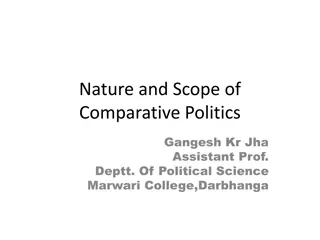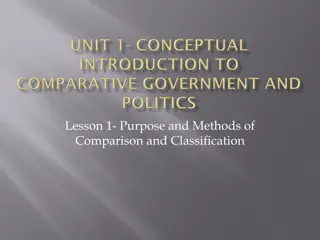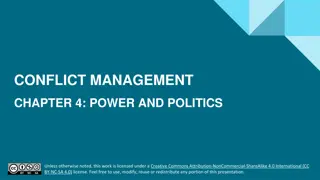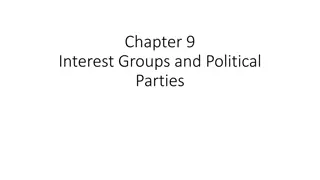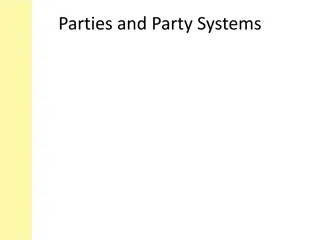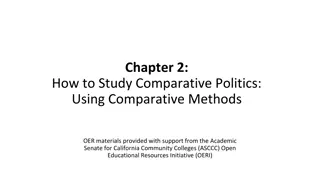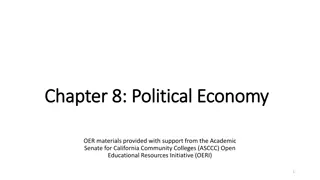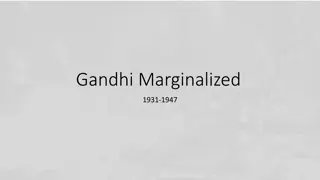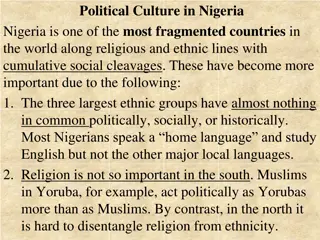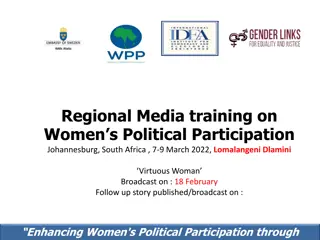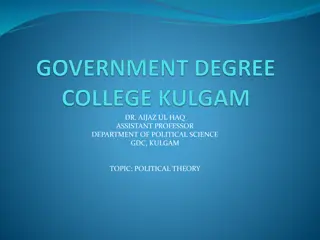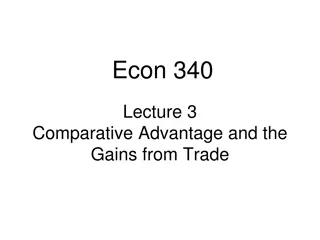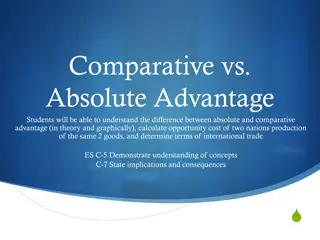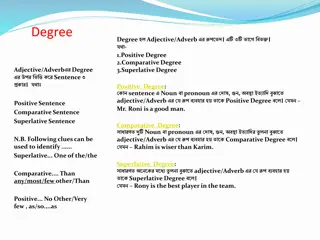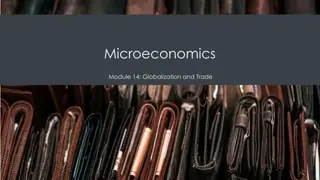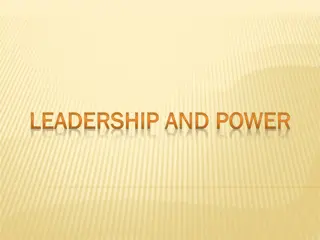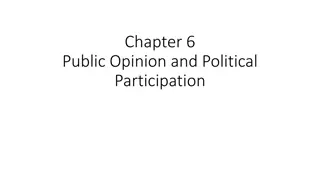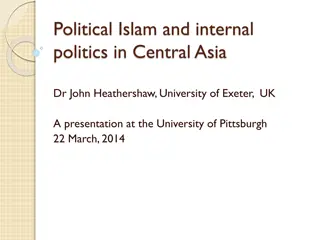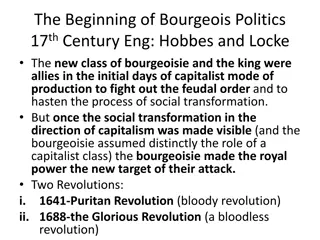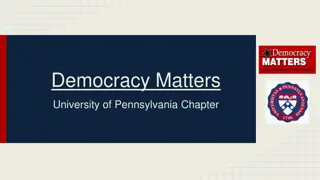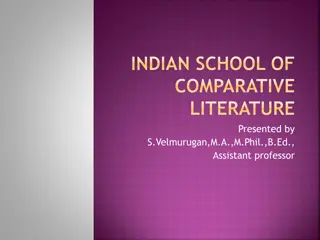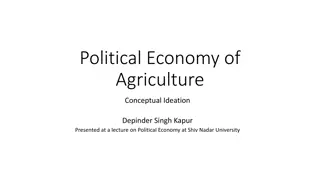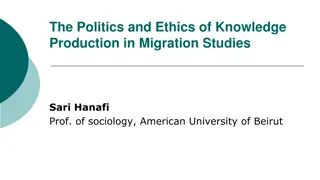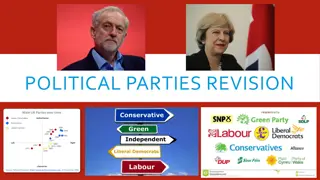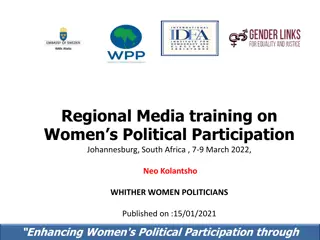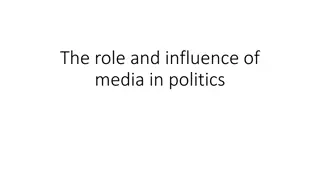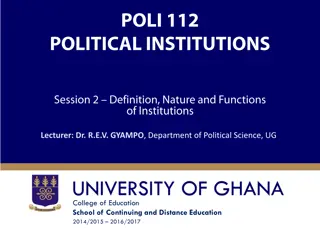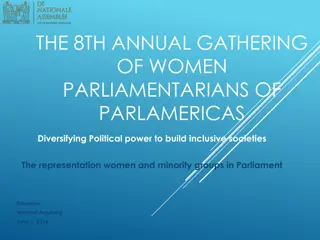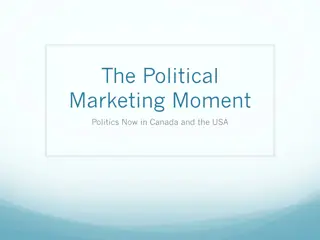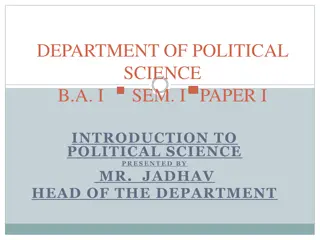Understanding Comparative Politics: Power, Influence, and Political Phenomena
Politics involves power and influence, where individuals strive to achieve their goals by influencing others or breaking free from external influences. Political science delves into the study of power and political phenomena, while comparative politics focuses on analyzing political dynamics within and between countries through various methods and definitions. From elections to international relations, it covers a wide array of topics shaping modern governance.
Download Presentation

Please find below an Image/Link to download the presentation.
The content on the website is provided AS IS for your information and personal use only. It may not be sold, licensed, or shared on other websites without obtaining consent from the author. Download presentation by click this link. If you encounter any issues during the download, it is possible that the publisher has removed the file from their server.
E N D
Presentation Transcript
Politics is the subset of human behavior that involves the use of power or influence. Poweris involved wheneverindividuals can t accomplish their goals without either trying to influence the behavior of others or trying to wrestle free from the influence exerted by others.
Political science is the scientific study of power. Any situation that involves the useof power is a political phenomenon. If you re interested in power (who has it?, where does it come from?, when is it used?), then political science is for you.
Three definitions of comparative politics: 1.The study of political phenomenain every country exceptthe onein which thestudentresides.
Three definitions of comparative politics: 1. The study of political phenomenain every country exceptthe onein which thestudentresides. 2. The study of political phenomenathrough the comparative method.
Three definitions of comparative politics: 1. The study of political phenomenain every country exceptthe onein which thestudentresides. 2. The study of political phenomenathrough the comparative method. 3. The study of political phenomenathat are predominantly within country relationships.
Elections Conflict PartySystems Revolution Foreign Policy Executive-Legislative Relations PoliticalEconomy Environmental Politics International Organizations InterestGroups Legislatures InternationalPolitics (Between Countries) Comparative Politics (Within Countries)
Traditional Approach It s week 10, soit must be Mexico. Britain, France, China, Russia, India, Mexico, and Nigeria
Our Approach Problemoriented Scientific Strategic Methods
ProblemOriented Causesand consequences of democracyand dictatorship Causesandconsequencesof democratic anddictatorial institutions
ProblemOriented Why doesthe state exist and where does it comefrom? Whyaresomecountriesdemocraciesandothersdictatorships? Whydosomeregimes treat their citizens better than others? Why do somecountries have many parties but others have few?
ProblemOriented Explanation rather than description. We remoreinterestedin explaining,rather than describing,why politics is organizedalong ethnic lines in somecountries but class linesin others, orwhysomecountries aredemocraciesbut others dictatorships.
ProblemOriented Commonproblems Credible commitment problems Collective action problems Principal-agent problems Preferenceaggregation problems Coalition formation problems Information and monitoring problems
Science Thescientific methodinvolvesformulating explanationsthat produce conjectures about the world that can be compared with experience. Whenscientific theoriesareconstructedproperly,they yield statements about the world that can, in principle, be tested. This allowsus to use observationto determinethe truth valueof those statements andmakeinferencesabout the usefulnessof our theories.
Science Focuson how to think rather than what to think.
Science Political ideologiesdon t fit with the emphasis on scientific theories and empirical evidence. Onewayin which political ideologies differ from scientific theories is that they typically involve contradictory statements. This interfereswith ourability to useobservationto evaluatethe truthfulness of the assertions that a political ideology makesabout the world.
Science The purpose of a political ideology such asconservatism, liberalism, and socialism isn t to understand the world. Instead,it s to motivate political action, giveaspecificmeaningto the world, and justify a particular system of power.
Science While contradictory premises spell disaster for scientific theories, they may just be the thing that progenitors of political ideologies are looking for. This is because they allow them to lead peopleto accept whatever conclusion they want them to. We ll focus on scientific theories, not political ideologies.
Strategic We adopt an explicitly strategic approach to studying political phenomena. Political outcomes result from the interaction of individuals seeking goals in an environment in which goal attainment is constrained by their resources and complicated by the choicesof other actors. Strategic behavior is central to politics.
Methods You ll be introduced to a variety of methods that have become central to the study of comparative politics. This will allow you to better evaluate the theories and empirical evidencewe ll coverfor yourself.



